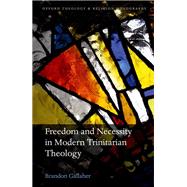
Freedom and Necessity in Modern Trinitarian Theology
by Brandon GallaherRent Textbook
Rent Digital
New Textbook
We're Sorry
Sold Out
Used Textbook
We're Sorry
Sold Out
Summary
Author Biography
Brandon Gallaher is Lecturer in Systematic and Comparative Theology at the University of Exeter.
Table of Contents
References and Abbreviations
Introduction: The Absolute Freedom of God as Mystery and 'Problematic'
1. Freedom and Necessity as a Trinitarian Mystery and 'Problematic'
2. Divine Freedom--A Dialectical Approach: From Freedom to Necessity--The Shape of a 'Problematic' (A)
3. Divine Freedom--A Dialectical Approach: From Necessity to Freedom--The Shape of a 'Problematic' (B)
Part I: Part I: God as both Absolute and Absolute-Relative in Sergii Bulgakov
4. 'Sophiological Antinomism'--Sergii Bulgakov's debt to and Critique of Vladimir Solov'ev
5. God as Absolute and Absolute-Relative in Bulgakov: Theological Antinomy in the Doctrine of God
6. Divine Freedom and the Need of God for Creation
Part II: Divine Self-Determination in Jesus Christ in Karl Barth
7. Trinity and the Doctrine of Election in Karl Barth
8. Trinity, Freedom, and Necessity in Karl Barth: A Dialectical Approach
Part III: Jesus Christ and the Trinitarian Appropriation of the Dialectic of Freedom and Necessity in Hans Urs von Balthasar
9. The Metaphysics of Love: Four Steps
10. The Trinity, Creation, and Freedom: More on the Fourth Step
11. Christ, Creation, and Divine Possibilities--'Sheltered within' the Trinity
Conclusion
12. Concluding Unsystematic Systematic Postscript
Bibliography
An electronic version of this book is available through VitalSource.
This book is viewable on PC, Mac, iPhone, iPad, iPod Touch, and most smartphones.
By purchasing, you will be able to view this book online, as well as download it, for the chosen number of days.
Digital License
You are licensing a digital product for a set duration. Durations are set forth in the product description, with "Lifetime" typically meaning five (5) years of online access and permanent download to a supported device. All licenses are non-transferable.
More details can be found here.
A downloadable version of this book is available through the eCampus Reader or compatible Adobe readers.
Applications are available on iOS, Android, PC, Mac, and Windows Mobile platforms.
Please view the compatibility matrix prior to purchase.
